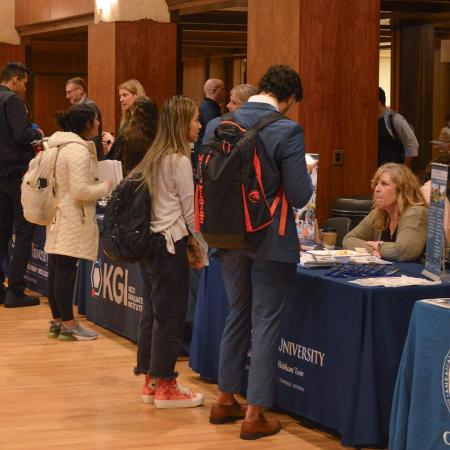Jade Sentker, 23, was a pre-med student for her first two years at Oregon State, but taking Introduction to Genetics as a junior opened her mind to new possibilities for her future career. “I was immediately fascinated by what I learned about the mechanisms of inheritance and about the rapidly growing pace and possibilities of modern genetic research,” she says.
Sentker, who grew up in the Portland area, graduated Cum Laude in 2019 with a major in biology, a concentration in genetics and a minor in chemistry. She is currently applying to master’s degree programs in genetic counseling, while gaining experience working with disadvantaged populations as a psychiatric technician at Albertina Kerr Center in Portland, a service provider for children and adults with intellectual and developmental disabilities and mental health challenges.
How Sentker came to change her career goal began with a conversation with her genetics professor about how she might be able to work with genetics as a doctor. The conversation led to many more conversations, thanks to her enrollment in the Science Professional Pursuits Program or SP3 – a three-credit professional development course designed for College of Science students.
The three-term course offers students 1-on-1 coaching as well as skill-building for job search and interview preparedness. As she researched genetic counseling, she began to realize that she was more interested in helping patients find answers than in doing surgery, for example. And she learned that a master’s program in genetic counseling would take 21 months plus passing a board certification exam, which also appealed to her. She is currently applying to six of 44 such programs in the U.S. and Canada.
According to Sentker, when she took her introductory genetics course at OSU there were courses offered in genetics and genomics, but not genetic counseling. “I went to Chris Larson, one of the SP3 coaches, to discuss how I could pursue a career in genetic counseling, and he encouraged me to explore my options. He said that there might well be jobs in STEM that don’t yet exist. Many people are aware of genetic counseling through stories about BRCA, the gene associated with familial breast cancer. The three primary sub-fields now include prenatal, pediatric and cancer, however an increasing number of other medical specialties are beginning to use genetic counseling.
“I also got help from Chris and several of the SP3 assignments in finding, applying for and getting accepted for a cancer immunology research internship in Portland after I graduated that would give me a solid background in the direct science that underlies biomedical breakthroughs.”
Sentker says that her experience in SP3 was cumulatively very helpful. “They encouraged us to think about experimental experiences. It was confidence-building, too. Overall, it helped me to make professional development a habit.”
Word of mouth about SP3 has spread in the College of Science. Some 150 to 200 students have now taken the course, according to Tamara Mitchell (’07), associate director of Learning and Design, Integrated Professional Development and Industry Programs. Each SP3 cohort has an average of 50 to 70 students who interact with one another in small groups of six to eight students.
SP3 is open to all College of Science undergraduates in good academic standing with sophomore or higher status. What makes it especially valuable, says Mitchell, is that the course is individually tailored to meet student needs with content delivered through learning methods ranging from workshops to 1-on-1 coaching to mock interviews and special events like the College’s annual Science Pro career exploration workshop.
“We pride ourselves on equal access and diversity,” she adds. “Our goal is to ensure that all science majors gain the professional skills and social fluency necessary to be career-ready and poised to enter the workforce or graduate school.”



